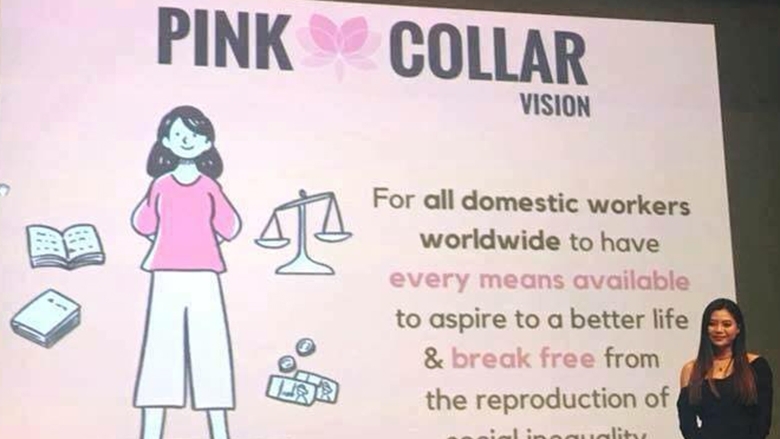Zenna Law has fond memories of being raised by domestic workers for the majority of her life who became integral members of her own family. Growing up, she began to learn about the hardships that foreign domestic workers face - but it wasn’t until Law volunteered at a social organization in Moscow that she was truly exposed to the difficult situations domestic workers lived in. Since then, it has become her mission to help the domestic workers by bringing them into the formal economy.
With the help of Elaine Sim, 26, and Sophia Aliza Jamal, 26, Law has founded Pinkcollar - a tech_enabled recruitment agency which is a shared economy platform operating online for migrant domestic workers in Malaysia. Employing ethical sourcing and hiring practices, Pinkcollar’s mission is to end the forced labor and trafficking of domestic workers.
The issue is no easy one to tackle. Middlemen recruitment agencies have been criticized for making domestic workers sign contracts they have difficulty understanding, forcing workers into debt bondage by charging illegal recruitment fees, deducting workers’ salaries, restricting freedom of movement, and failing to provide knowledge on legal rights. According to Law, this leaves the over 250,000 migrant domestic workers registered in Malaysia at risk of exploitative working and living conditions, including abuse.
Law relates some of the stories she has heard from domestic workers she now works with. “They told us about how their belongings were confiscated, including their families’ information to prevent workers from contacting them. Body checks were also performed on them without their permission, among other things.”
“As an ethical agency, we aim to address these issues by targeting domestic workers seeking safe and dignified jobs, and employers looking for a better way to hire. We want to fix Malaysia’s domestic work sector through a recruitment service that promises responsible matching, transparency, and community support for both workers and employers,” Law said.
Leveraging on technology and the Internet, Pinkcollar has successfully digitalized a conventional method of hiring domestic workers via middlemen agencies, by utilizing social media to source workers directly – thus eliminating the need to engage recruitment brokers and giving worker community groups open channels for support, resources and direct reporting of grievances. Rigorous vetting of worker-candidates and employers using technology are also conducted to match them to domestic workers.
“We have plans to expand on our tech capacities in ways that progress our mission, while remaining conscious that our company’s core lies in the humane care and treatment of people — employers and workers alike,” Law said.
Such innovation has the power to be disruptive and transformative, potentially wielding impacts towards the Sustainable Development Goals, like promoting greater gender equality in work and reducing inequalities and caste-based discrimination.


